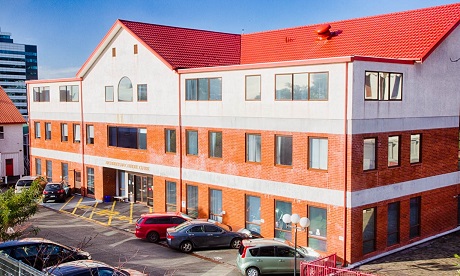A poor seismic report has closed the Wellington Archdiocese’s Catholic Centre.
The Centre’s management says the Detailed Seismic Assessment Report issued in February rated some of the Centre’s key structural elements at just 20 per cent of the New Building Standards.
A peer review of the engineer’s report has been commissioned, so decisions about the building’s future can be made.
At that stage, options will include whether to re-strengthen the building, demolish and rebuild, or demolish and redevelop the Hill Street site.
Nimble and flexible
The Archdiocesan Centre is the nucleus of operations for Cardinal John Dew and a range of diocesan tenants from several national church offices.
“Once the peer review is received, we will be in a position to make decisions around whether the Catholic Centre can be strengthened and we can one day return there, or whether our move out of the Centre needs to be permanent,” says Archdiocesan General Manager John Prendergast.
“Whichever decision ends up being taken though, it seems very likely that we will need to be in alternative accommodation for at least the next 12-24 months.”
Making new arrangements “provides an opportunity for us to be nimble and flexible, and to rethink the way we operate in responding to the challenge.”
Prendergast says there are two options currently on the table for relocating the Centre.
One is the “all together” model. This would identify office accommodation in one place that could house all the Archdiocese’s staff and possibly also all the tenant staff.
The other option is the “distributed” model, where archdiocesan and tenant staff would be housed in teams but in separate accommodation.
Project Stronger
The report surprised some, because, after the Christchurch earthquake, the Archdiocese in 2012 initiated “Project Stronger,” an assessment process that determined which of the Archdiocese’s buildings were at risk.
With a price-tag of more than $3 million just to complete the assessments and decide on remedial work, 25 churches, 4 halls and 7 presbyteries were assessed at less than 34 percent of the national building standard.
In 2014 a team of international experts began a study of New Zealand’s churches to assess which are the most vulnerable to earthquakes.
In February 2014, Project Stronger’s David Mullin told Stuff that their research identified buildings that did not meet current standards.
In July 2018, the adjacent Metropolitan Cathedral of the Sacred Heart was classified earthquake-prone and closed due to safety concerns.
In August 2020, work to strengthen and restore the Cathedral began. With more than $11 million of the $16.5 million required to complete this project now secured, efforts are underway to raise the remaining $5.5 million.
Sources
- Catholic Archdiocese of Wellington
- Catholic Archdiocese of Wellington
- Supplied – Wellington Archdiocesan Centre
- Stuff
- Stuff
- Cathedral Campaign
News category: New Zealand.




